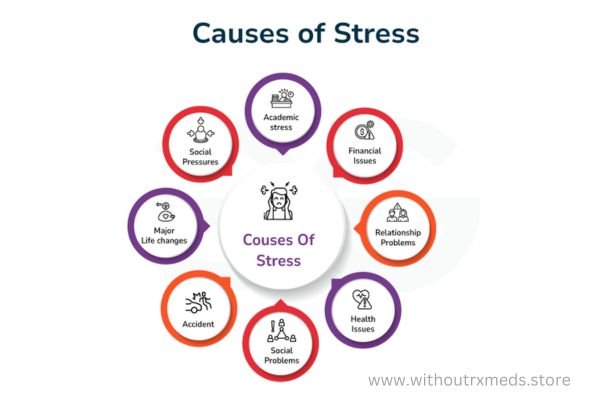6 Bold Steps to Take Control of Your Stress Before It Controls You
Stress is something that cannot be avoided in life. It can come to anyone, at any level, and in different ways. It can come from work, relationships, financial stress, or personal issues. It can get into your mind, emotions, and well-being. Although some of that can be good, helping you stay alert and motivated, chronic or unmanaged stress can become overwhelming and start to take control of your life. It can cloud your judgment, drain your energy, and negatively impact both your mental and physical health.
This can dictate the way you react to things, the interaction you have with people, and even your perception of yourself when it becomes the norm. You may find yourself trapped in a vicious cycle of always being a step behind, where you can’t catch your breath, as it were, or rest and feel peaceful for a moment. Eventually, this can lead to chronic stress or burnout, developing anxiety, depression, and the increase of the most serious diseases like high blood pressure, heart disease, or a weakened immune system.
The good news is that it does not have to control you. While you may not be able to eliminate stress entirely, you can take proactive steps to regain power over your mind and body. Learning how to effectively manage can help you feel more in control, allowing you to navigate life’s challenges with resilience and clarity.
In this blog, we are going to discuss six bold steps that will empower you to take control of your stress before it takes control of you. Intentional changes in mindset, habits, and daily routine will build a stronger, healthier, and more balanced life—where stress no longer dictates happiness.
What is Stress?
It is the body’s natural response to challenges, demands, or threats, whether real or perceived. It triggers a fight-or-flight response, releasing hormones like cortisol and adrenaline to help you react quickly. While short-term can be beneficial—keeping you alert and motivated it can harm your mental and physical health. It can lead to anxiety, fatigue, sleep disturbances, weakened immunity, and even long-term health conditions like heart disease. Managing stress effectively is key to maintaining overall well-being and balance in life.

Causes of Stress:
It can be caused by a variety of factors, often categorized into external and internal triggers. Here are some common causes:
1. Work-Related
- Heavy workload and tight deadlines
- Job insecurity or workplace conflicts
- Long working hours and lack of work-life balance
- High expectations and pressure to perform
2. Financial Stress
- Struggling with debt or unexpected expenses
- Job loss or unstable income
- High cost of living and financial responsibilities
- Worrying about future savings or retirement
3. Relationship and Social Stress
- Conflicts with family, friends, or partners
- Social isolation or loneliness
- Toxic relationships or lack of emotional support
- Pressure to meet societal or cultural expectations
4. Major Life Changes
- Moving to a new place
- Marriage, divorce, or breakups
- Loss of a loved one
- Becoming a parent or taking on new responsibilities
5. Health-Related
- Chronic illness or pain
- Mental health disorders like anxiety or depression
- Poor sleep and lack of exercise
- Concerns about aging and overall well-being
6. Daily Life and Environmental Stressors
- Traffic, noise, or overcrowding
- Managing household responsibilities
- Unpredictable events or sudden changes
- Constant exposure to negative news or social media pressure
This affects people differently, and what may be stressful for one person might not be for another. Identifying your specific stressors is the first step toward managing and reducing it effectively.

6 Steps to Take Control of Your Stress
It is a part of life, but if left unchecked, it can take over your mind, body, and daily routine. Instead of letting it control you, it’s time to take charge. By making bold, intentional changes, you can regain balance, build resilience, and navigate life’s challenges with confidence. Here are six powerful steps to help you stay in control and prevent it from running your life.
1. Identify Your Stress Triggers and Take Charge
The first step in managing effectively is understanding what’s causing it. Not all stress is obvious, and some triggers may be deeply ingrained in your daily routine without you realizing it. Take a moment to reflect on what situations, people, or habits make you feel tense, anxious, or overwhelmed.
🔹 Action Step: Keep a stress journal for a week. Write down when you feel stressed, what triggered it, and how you responded. Identifying these patterns will help you gain clarity on which areas of your life need adjustment.
Once you pinpoint your stress triggers, take control by either eliminating them or finding healthier ways to respond. For example, if work load is a recurring issue, consider setting clearer boundaries, delegating tasks, or improving your time management skills.
2. Master Your Mindset with Positive Reframing
Your thoughts have a powerful impact on how you experience it. When negative self-talk takes over, it intensifies. However, by shifting your mindset and practicing positive reframing, you can train your brain to handle stressful situations with more resilience.
🔹 Action Step: When you catch yourself thinking negatively, pause and ask:
- Is this thought based on facts or assumptions?
- What’s another way to view this situation?
- What can I learn or gain from this experience?
For example, instead of thinking, “I’ll never meet this deadline!” reframe it to “I’ve handled tight deadlines before, and I’ll do my best with the time I have.” Small mental shifts can greatly reduce stress and improve your outlook on life.
3. Prioritize Self-Care Without Guilt
Self-care isn’t a luxury—it’s a necessity for handling it effectively. Many people feel guilty for taking time for themselves, but neglecting self-care leads to burnout, exhaustion, and even more stress.
🔹 Action Step: Set aside at least 30 minutes daily for activities that help you relax and recharge. Some great options include:
✔ Exercise (yoga, jogging, or even a simple walk)
✔ Mindfulness & meditation
✔ Listening to music or reading a book
✔ Spending time in nature
✔ Engaging in hobbies you love
Taking time for yourself isn’t selfish—it’s essential for maintaining balance and preventing it from taking over your life.
4. Create Strong Boundaries to Protect Your Peace
One of the biggest sources is overcommitting and people-pleasing. If you find yourself constantly saying yes to things that drain you, it’s time to set firm boundaries.
🔹 Action Step: Start practicing saying NO without guilt. You don’t have to justify your decisions to others. Protecting your time and energy is crucial for your well-being.
For example:
❌ Instead of: “I guess I can take on that extra project…”
✅ Say: “I appreciate the opportunity, but I can’t commit to this right now.”
When you set boundaries, you give yourself the freedom to focus on what truly matters, reducing stress and increasing inner peace.
5. Build a Stress-Resilient Lifestyle
Long-term management requires lifestyle adjustments that support your mental and physical well-being. Small daily habits can make a massive difference in how your body and mind respond to stress.
🔹 Action Step: Incorporate these key habits into your daily routine:
🥗 Eat a balanced diet: Nutrient-rich foods fuel your brain and help regulate stress hormones.
💤 Prioritize sleep: Aim for 7–9 hours of restful sleep each night. Lack of sleep worsens stress levels.
🚰 Stay hydrated: Dehydration can cause irritability and fatigue, making stress harder to manage.
🏋️ Move your body: Regular exercise releases endorphins, which naturally reduce stress and boost mood.
When your body feels strong, your mind follows, making it easier to handle stress in a healthier way.
6. Seek Support and Connection
You don’t have to deal with it alone. Having a strong support system can make a world of difference when it comes to managing life’s challenges. Whether it’s family, friends, or professional help, surrounding yourself with supportive people lightens the mental load.
🔹 Action Step: Make a conscious effort to connect with loved ones regularly. Call a friend, spend time with family, or join a supportive community.
If it is becoming overwhelming, don’t hesitate to seek professional help. Therapists, counselors, and support groups can provide valuable guidance and coping strategies. There is no shame in asking for help—it’s a sign of strength, not weakness.

Final Thoughts: Take Back Your Power Over Stress
This may be a part of life, but it does not have to control you. By taking these six bold steps—identifying your triggers, shifting your mindset, prioritizing self-care, setting boundaries, building a resilient lifestyle, and seeking support—you can reclaim your mental well-being and live a healthier, more fulfilling life.
The key to stress management is consistency. Start small, make gradual changes, and celebrate your progress along the way. You have the power to take control—starting today!
💡 What’s one step you’ll take today to reduce stress? Share in the comments! 💡






